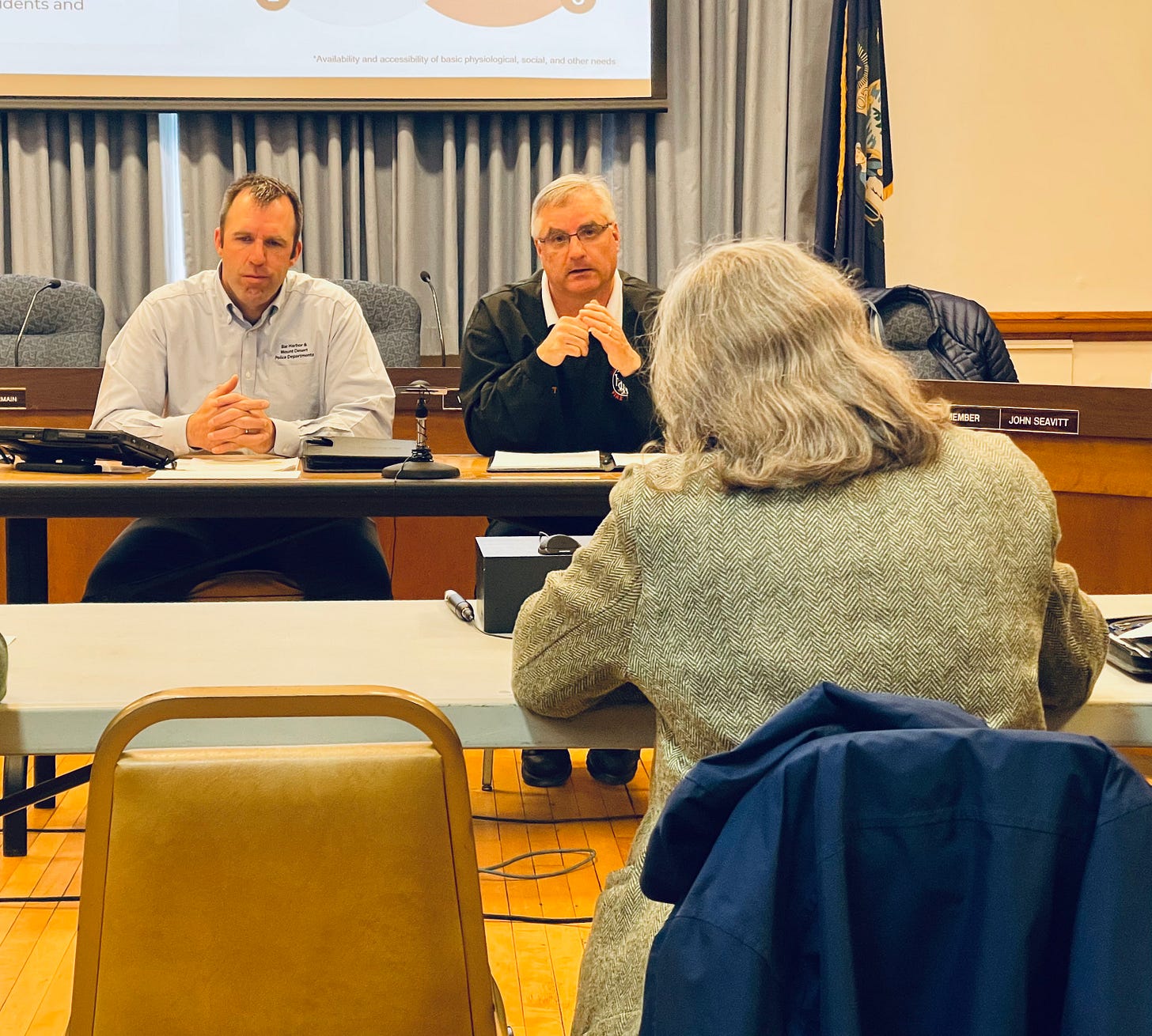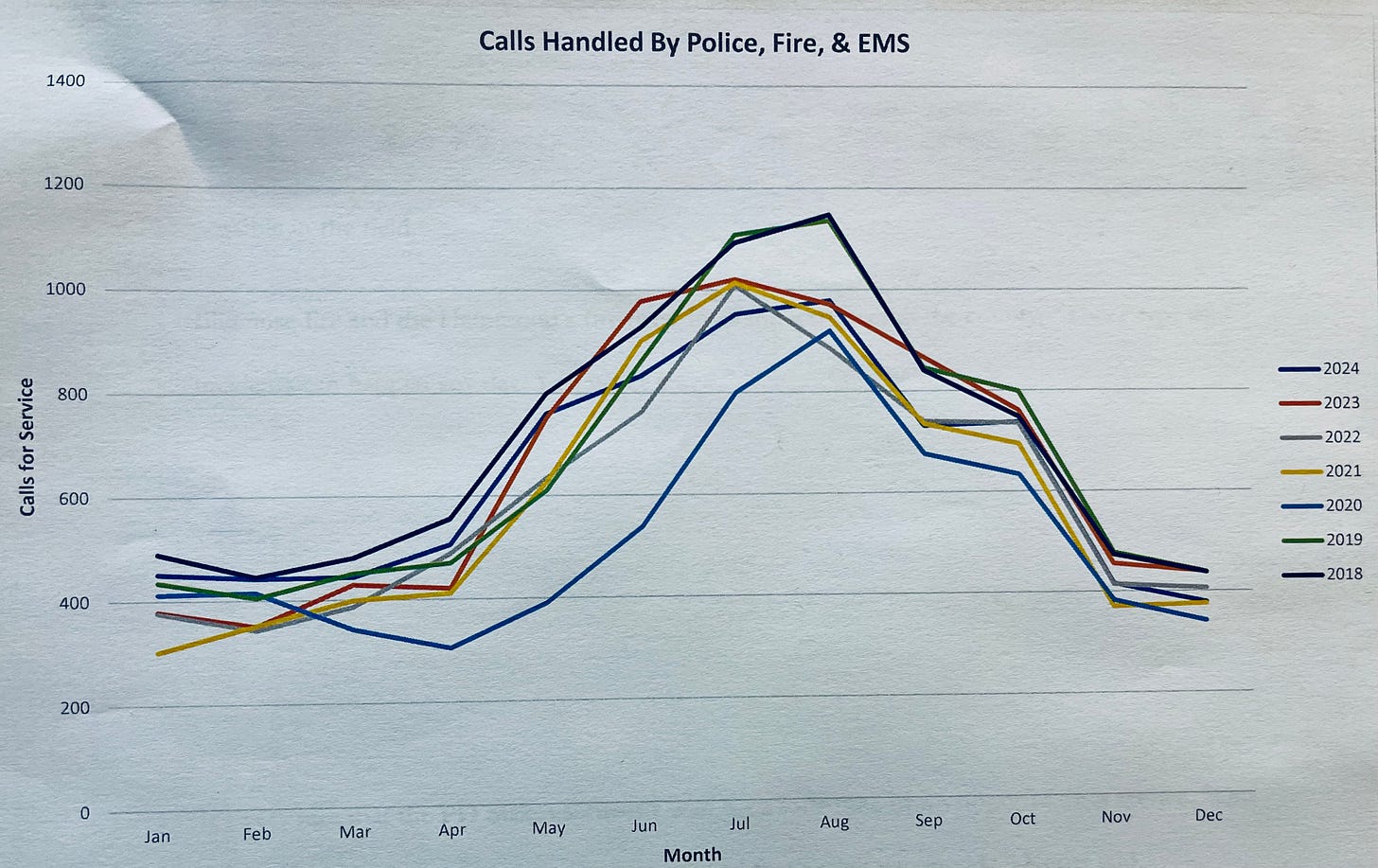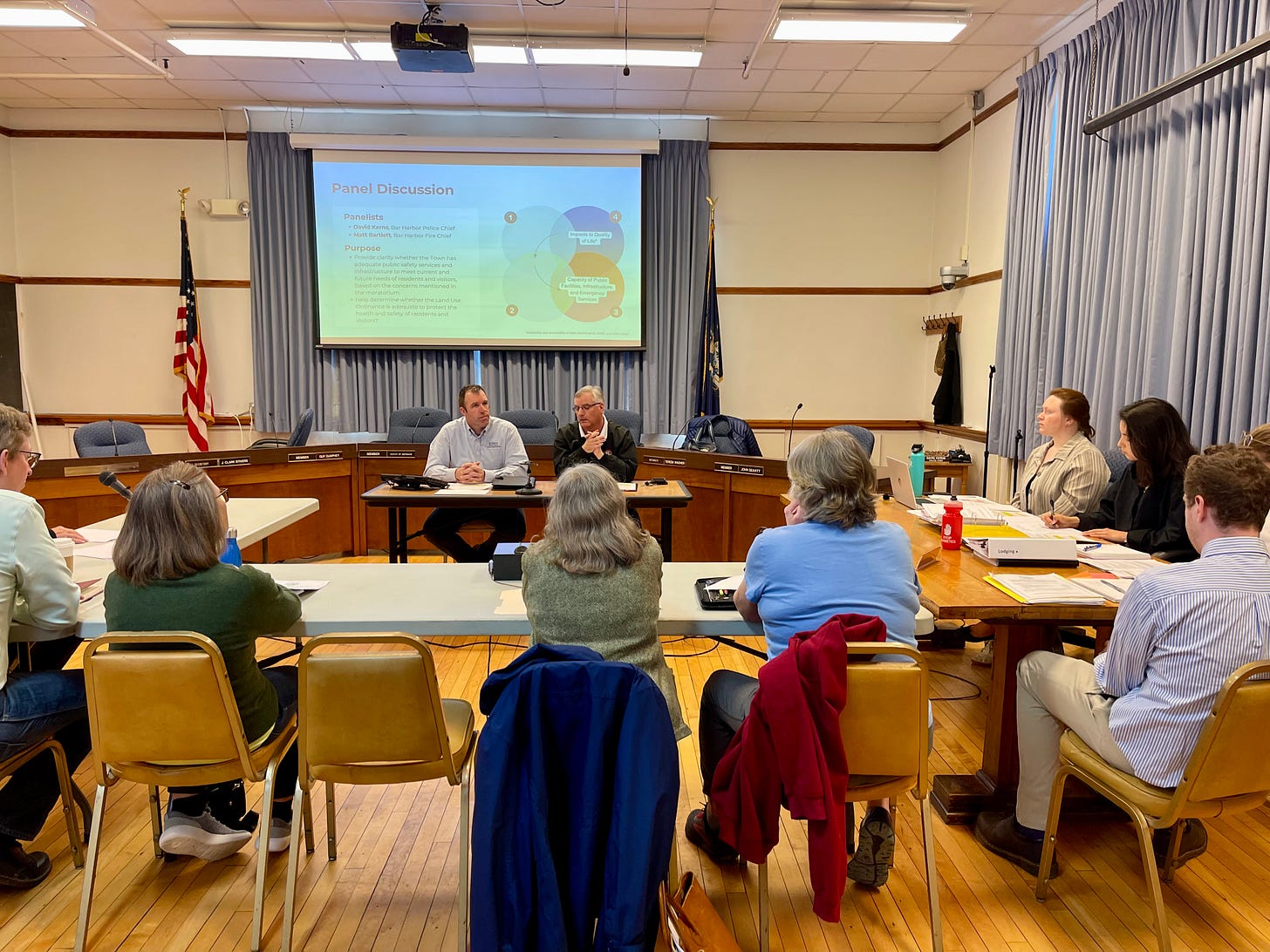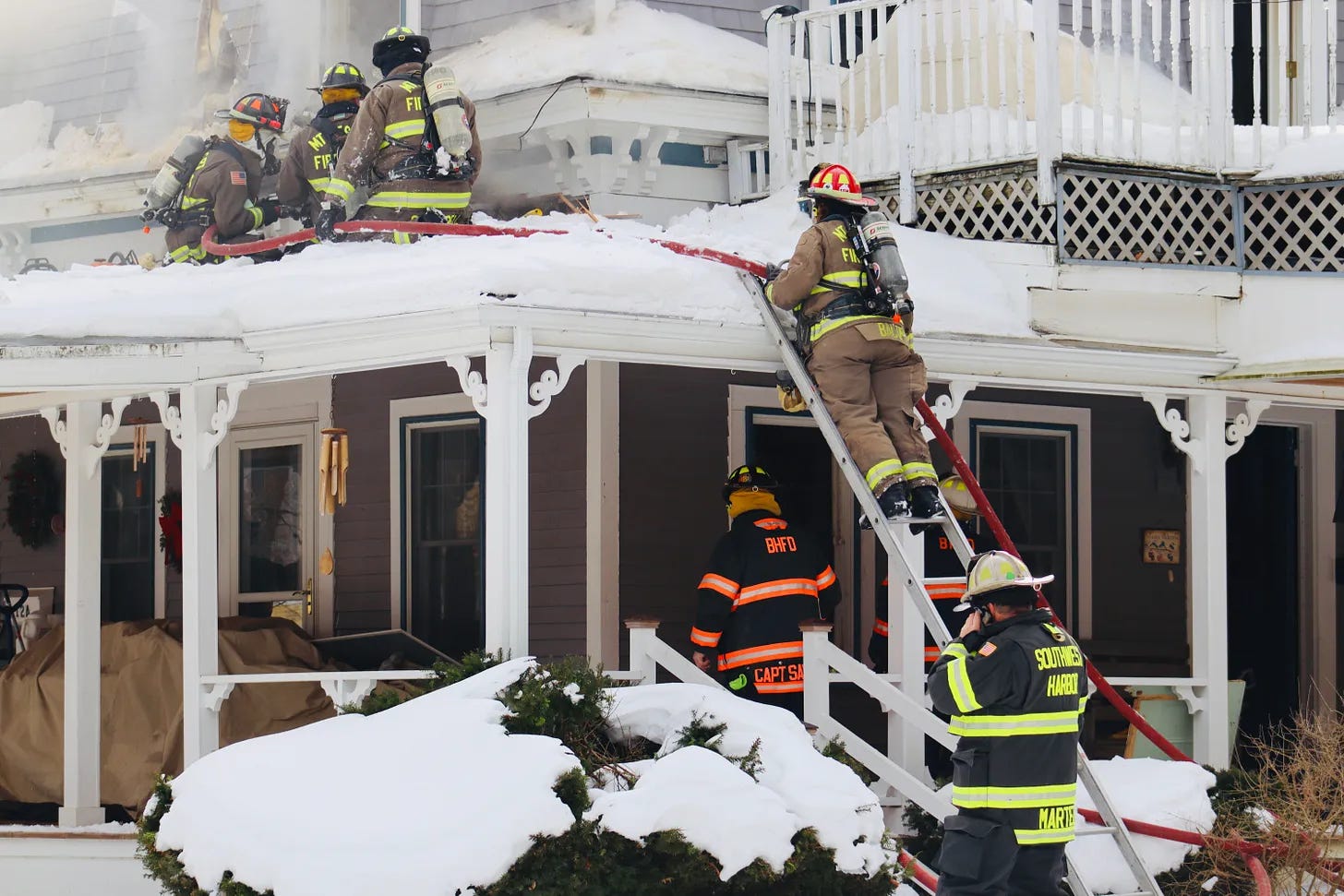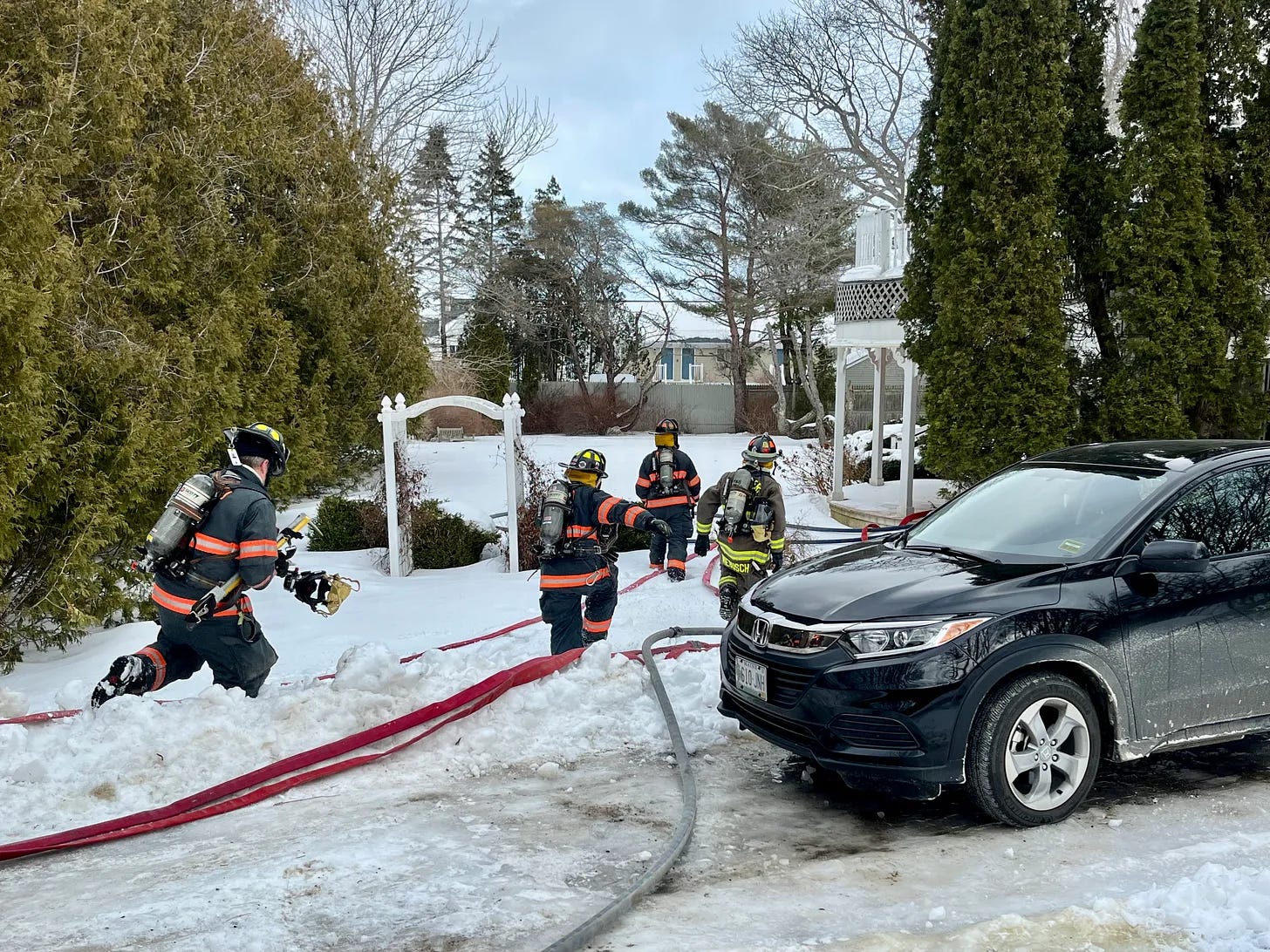Bar Harbor Public Safety Chiefs Outline Current Challenges, Future Needs Amid Lodging Moratorium
The Bar Harbor Story is generously sponsored by Paradis Ace Hardware.
BAR HARBOR—Are Bar Harbor’s public safety services and related infrastructure adequate to meet the town’s current and future needs?
That was one of the questions meant to be answered as Bar Harbor Housing and Community Planner Cali Martinez led the town’s police and fire chiefs in a discussion at the planning board’s workshop about the current moratorium on lodgings.
Martinez asked the chiefs questions. They answered and there was a short amount of time for the planning board members to ask their own during the Thursday, April 24 workshop.
According to a slide presented, Police Chief David Kerns and Fire Chief Matt Bartlett were meant to show the planning board if Bar Harbor had “adequate public safety services and infrastructure to meet current and future needs of residents and visitors based on the concerns mentioned in the moratorium” and “help determine whether the land use ordinance is adequate to protect the health and safety of residents and visitors?”
The Bar Harbor moratorium on lodging mentions concerns about public safety as a link to the town’s pause on the building of all lodging units. The planning board and staff has been tasked with collecting data, holding workshops, and trying to understand aspects of the town’s zoning dynamics.
A line within the moratorium reads, “WHEREAS, residents of the Town of Bar Harbor have expressed concerns that an increase in certain transient accommodations will further exacerbate traffic congestion, degrading the ability of fire, health, and other emergency services to protect people within the town.”
FUTURE NEEDS
For a Maine police department, Bar Harbor isn’t a small town or a big city, but the seasonal influx creates a variety of calls, Chief Kerns said.
The department doesn’t have a specialized detective division. Investigations that individual officers conduct are more complex because of the growing amount of internet and computer crimes, which is not isolated to the island.
Chief Bartlett said that they currently have an engine and ambulance in Town Hill, but there is no staff assigned to Town Hill.
THE CURRENT DATA
Chief Kerns made a graph of all annual call volumes which represented all public safety (police, fire, and EMS) calls from 2018 to 2024.
“The two highest years in July and August those are actually 2018 and 2019,” Chief Kerns said.
“We’re in the same spot. Our call volume for the last few years hasn’t reached the peak,” Chief Bartlett said.
There was no break-out for what calls had to do with overnight visitors or daily visitors rather than residents, but the overall curve shows an increase of calls that in some years was three times the amount in July compared to January.
New board member John Seavitt asked about the increased budgetary costs for the departments between those years, but Planning Board Chair Millard Dority said that budget questions weren’t part of the planning board’s purview.
That question wasn’t answered. Town records show that in FY 2018 the fire department was approved for approximately $853,700 and another $585,600 for hydrants. The town’s dispatch services were approximately $220,000. The police budget was approximately $1,213,223.
In FY 2024, the fire department’s budget was approximately $1,706,045 and hydrants $620,740. The town’s dispatch services were approximately $300,398. The police budget was approximately $1,598,000.
Chief Bartlett said the expectation of EMS and fire level of service has changed since the 1990s.
It used to be, he said, “you show up. You have an ambulance. The expectation was ‘drive fast.’”
Now it’s about providing the highest level of care possible in the field.
RETENTION
Much of their discussion concerned the time it takes to train police officers and firefighters to meet the community’s expectations for a level of service. There are 18 full-time police staff.
Housing can become an issue for new officers, Kerns said. He has lived in Ellsworth for years. Some current officers live on the island and some do not.
Chief Bartlett, who lives in Town Hill, said that he has or has had firefighters who live in Orrington, Hampden, Dedham, and Bucksport. When they go off-duty, they would have a longer travel time to respond to any emergency calls.
“A big thing for us over the time, the challenge has been the recruitment and retention of staff,” Chief Bartlett said.
Martinez reiterated that recruitment and retention is the biggest challenge for the department. That is not an issue isolated to Mount Desert Island. Firefighting volunteers have decreased across the nation.
According to a Maine Monitor article, “the closure of ambulance services and lack of EMS responders around the state has prompted other departments to consider training firefighters as medical personnel.”
Firefighters throughout Mount Desert Island have helped with medical calls, CPR, search and rescue, drownings, accidents, traffic control, lift-assists, and more. It’s not just fighting fires any longer.
“As many of our members have stated, ‘we all need to work together’ to meet not only the fire department’s, but all essential emergency service’s needs and their missions. This methodology is something seen not only across our state, but nationally,” Southwest Fire Chief Tom Chisholm said in an October interview. “As our town (Southwest Harbor) specifically has grown and evolved over the past several years, the fire department has worked hard to meet that need/demand. By taking a mindful but proactive approach, I with the support of our members, town leaders, and most importantly our community, have taken small steps to keep our small fire department up and running at the lowest cost while too trying to ensure that if someone calls for help, someone show’s up and in a timely manner.”
In Southwest Harbor, members began to be compensated for the hours they work on calls. That began in July 2023. Now, they’ll also get a stipend for hours worked on monthly training. That began after July 2024.
“But money to our deserving members is just part of the stop gap. Sometimes there just isn’t enough hours in the week as many members have said. As the number of locals active on the Southwest Harbor Fire Department slowly decline due to many contributing factors (housing, members time, call volumes, abilities to volunteer etc.), increasing training requirements and the need for competent personal in many areas of the fire service has too grown with it,” Chisholm said.
That department just received approval of a new ⅔-acre site of town-owned land adjacent to the fire station to be used for a potential training site for the Southwest Harbor Fire Department.
The site would hold a structure that “would be used to conduct a variety of essential training operations, including ladder operations, search and rescue drills, and basic firefighting tactics,” Southwest Harbor Town Manager Karen Reddersen wrote in her manager’s memo.
There is no cost to taxpayers for the structure, which the Southwest Harbor Fire Association will fund the site’s needs.
COLLABORATIONS AND CYCLICAL CHANGES IN NEEDS
Also at the meeting, Chief Kerns spoke to the collaboration of the Mount Desert and Bar Harbor police departments, neither of which is unionized.
“It’s really worked out well,” Chief Kerns said, adding that the collaboration occurred through incremental steps.
“It’s really an anomaly,” he said.
Other agencies in Maine have tried similar collaborations, but have failed.
Chief Kerns said that because the island is a contained environment it has helped the collaboration succeed and for a majority of the current staff it’s all they know.
“We’ve had a lot of people leave due to attrition and retirements,” he added.
Both chiefs said that when they interview people for positions, they stress the cyclical nature of calls where it is much busier during the summer because of tourism and seasonal residents arriving. That becomes a selling point for many who look toward that cycle, allowing for more experiences in the summer months and more training opportunities in the winter.
“We actually recruit based on the different seasons,” Chief Bartlett said, adding that a lot of his staff, which he praised, are looking forward to summertime calls.
“There’s an understanding coming in of what our culture is,” Kerns said, also praising his staff.
That said, both chiefs agreed, most of the larger events that required island-wide responses (and county wide responses) have occurred in the off-season. Mutual aid agreements where towns agree to assist each other in fire and medical emergencies help during those times. Police officers also can work outside their towns in certain situations.
Are we coming up on a turning point because of tourism, Martinez asked. Do we need to do things differently or do current protocols allow for adaption?
Chief Bartlett said there are very strong ties between communities on the island. Bar Harbor can take two EMS calls. A third call will have the department asking Mount Desert to cover.
He said, “We’re well positioned to handle the day-to-day.”
An incident will also be challenging because they are on an island. Neither chief mentioned any urgent land use regulation changes needed to keep the town safe.
LAND USE STANDARDS
Once the planning board asked questions, there was also discussion about if the fire service could respond to taller buildings if the town’s height maximums were changed. Chief Bartlett said that one story wouldn’t be a problem and that fire codes become more strict the taller that buildings are. However, when there is a fire, elevators are shut off and firefighters have to have more physical effort lugging equipment up stairs to top floors.
“It’s more of a challenge going up,” Bartlett said than compared to a sprawling structure.
The taller the building, the more the codes and requirements change. Sprawling structures are also composed of more wooden framing and materials while taller buildings tend to be more steel and masonry and noncombustible materials.
Correction: This story was updated at 11:11 a.m., April 29, to reflect Chief Bartlett’s current fire apparatus status in Town Hill. This is under the “Future Needs” section. We regret the error and appreciate Chief Bartlett letting us know.
Follow us on Facebook. And as a reminder, you can easily view all our past stories and press releases here.
If you’d like to donate to help support us, you can, but no pressure! Just click here (about how you can give) or here (a direct link), which is the same as the button below.
If you’d like to sponsor the Bar Harbor Story, you can! Learn more here.







